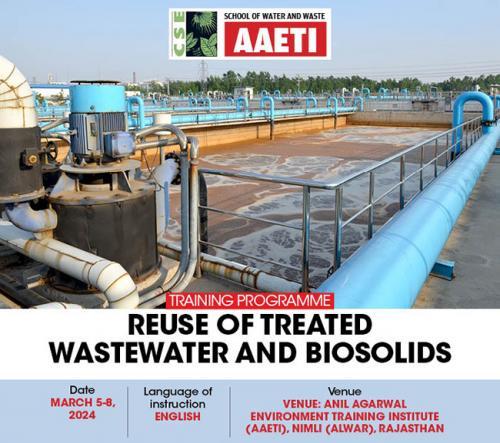Reuse of Treated Wastewater and Biosolids : CSE

![]()
Date: March 5 – 8 / Venue: Rajasthan
The Centre for Science and Environment (CSE) is a public interest research and advocacy organisation based in New Delhi. CSE researches into, lobbies for and communicates the urgency of development that is both sustainable and equitable. The scenario today demands using knowledge to bring about change. In other words, working India’s democracy. This is what we aim to do.The challenge, we see, is two-pronged. On the one hand, millions live within a biomass based subsistence economy, at the margins of survival. The environment is their only natural asset. But a degraded environment means stress on land, water and forest resources for survival. It means increasing destitution and poverty. Here, opportunity to bring about change is enormous.But it will need a commitment to reform – structural reform- in the way we do business with local communities. On the other hand, rapid industrialization is throwing up new problems: growing toxification and a costly disease burden. The answers will be in reinventing the growth model of the Western world for ourselves, so that we can leapfrog technology choices and find new ways of building wealth that will not cost us the earth. Our aim is to raise these concerns, participate in seeking answers and in pushing for answers, transforming these into policy and so practice. We do this through our research and by communicating our understanding through our publications. We call this knowledge-based activism. We hope we will make a difference.
INDIA HAS 16 per cent of the world’s population and only 4 per cent of its freshwater resources. Given the exponentially escalating demand for water, using recycled wastewater has emerged as a viable alternative to satisfy non-potable needs
As per the Central Pollution Control Board, cities in India collectively generate an estimated 72,368 million litre a day (MLD) of sewage. The country has 1,093 operational sewage treatment plants (STPs), with a combined capacity of only 26,869 MLD. Of the cities with populations exceeding 54 million, 32 have initiated recycle and reuse projects; 22 cities have not.
Promoting a circular economy is at the core of a sustainable and climate-resilient future. The Union Jal Shakti ministry has stipulated that cities must recycle and reuse at least 20 per cent of the water that they use. Similarly, sewage sludge or biosolids, produced as a by-product in various wastewater treatment stages, can be transformed into nutrient-rich organic material. The demand for freshwater can be managed only if steps like these are initiated and implemented with urgency. Centre for Science and Environment (CSE) offers a comprehensive training programme that can guide city administrators and planners to do this.
Who Can Apply
- National and state-level training entities, PMUs supporting SBM 2.0, AMRUT 2.0, Smart City, NMCG and HRIDAY
- Public health professionals
- Officials working on wastewater treatment in ULBs/cities/district/state
- Practitioners from consultancies, communitybased organisations, social welfare organisations, NGOs
- Independent researchers, academia and stakeholders working in the WASH sector
- 50% Discountfor NGOs, Academic Institutions, Students, Farmers
- 25% Discount for Industry Representatives, Consultants, Other Professionals
Course Fees
For Indian participants:
- Rs 25,600 (for double occupancy accommodation)
- Rs 28,000 (for single occupancy accommodation) For international participants:
- US $590 (for double occupancy accommodation)
- US $760 (for single occup
Limited Number of Full* and Partial** Fellowships Available.
*Full fellowship will cover travel, boarding and lodging, training kit and fee costs.
**Partial fellowship will not cover travel costs between Delhi and the participant’s respective location. Apart from that, it will cover all other costs.
Special Offers
50% off for college students and registered NGOs
25% off for industry, consultants, and professionals.
Venue
Anil Agarwal Environment Training Institute
WHAT DOES THE TRAINING PROGRAMME OFFER?
- The objective is to help states/cities/ULBs incorporate recycle and reuse projects in their planning, and promote practices that harness the potential of treated wastewater and biosolids. The training programme, thus, aims at:
- Developing an understanding of biosolids — their composition, characteristics, and treatment processes.
- Exposing participants to treatment technologies and helping them understand the agronomic benefits of biosolids, including their role in enhancing soil fertility, improving water retention, and promoting sustainable crop growth. Practical insights into application rates, methods and crop-specific considerations will also be provided.
- Helping in understanding treated wastewater reuse in the context of broader sustainability goals and challenges.
- Helping gain insights into local and national regulations governing treated wastewater reuse — compliance requirements, permitting processes, and the importance of adhering to quality standards to ensure safety of reused water.
- Helping in informed decision-making based on diverse applications of treated wastewater across sectors, including agriculture, industrial processes, landscape irrigation, and groundwater recharge; and in understanding the potential benefits and challenges associated with each application.
- Learning about water quality parameters, monitoring techniques and analytical methods to assess effectiveness of treatment processes and maintain compliance with reuse standards.
- Exposing participants to case studies that demonstrate successful treated wastewater and biosolid reuse projects globally and locally.
TRAINING METHODOLOGY
The training, imparted in English, will be focused on experiential learning: it will include individual/ group interactions, practical exercises, interactions with experts, class discussions, documentary films and a field visit.
FOR MORE DETAILS
FARAZ AHMAD
Deputy Programme Manager
Water Programme, CSE
PHONE: +91 8860933075
EMAIL: faraz.ahmad@cseindia.org

